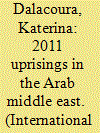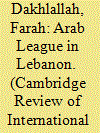| Srl | Item |
| 1 |
ID:
111690


|
|
|
|
|
| Publication |
2012.
|
| Summary/Abstract |
The Arab uprisings of 2011 are still unfolding, but we can already discern patterns of their effects on the Middle East region. This article offers a brief chronology of events, highlighting their inter-connections but also their very diverse origins, trajectories and outcomes. It discusses the economic and political grievances at the root of the uprisings and assesses the degree to which widespread popular mobilization can be attributed to pre-existing political, labour and civil society activism, and social media. It argues that the uprisings' success in overthrowing incumbent regimes depended on the latter's responses and relationships with the army and security services. The rebellions' inclusiveness or lack thereof was also a crucial factor. The article discusses the prospects of democracy in the Arab world following the 2011 events and finds that they are very mixed: while Tunisia, at one end, is on track to achieve positive political reform, Syria, Yemen and Libya are experiencing profound internal division and conflict. In Bahrain the uprising was repressed. In Egypt, which epitomizes many regional trends, change will be limited but, for that reason, possibly more long-lasting. Islamist movements did not lead the uprisings but will benefit from them politically even though, in the long run, political participation may lead to their decline. Finally, the article sketches the varied and ongoing geopolitical implications of the uprisings for Turkish, Iranian and Israeli interests and policies. It assesses Barack Obama's response to the 2011 events and suggests that, despite their profound significance for the politics of the region, they may not alter the main contours of US foreign policy in the Middle East in a major way.
|
|
|
|
|
|
|
|
|
|
|
|
|
|
|
|
| 2 |
ID:
111592


|
|
|
|
|
| Publication |
2012.
|
| Summary/Abstract |
Contrary to expectations, the Arab League has emerged as an active player in the Middle East region over the past decade. The League's roles in negotiations to end the 2006 Israel-Lebanon War and in the brokering of the 2008 Doha Agreement between warring Lebanese factions present two instances of 'partial' and 'direct' contributions to success in resolving major extra-systemic and minor internal conflicts. These developments are part of a global trend of the regionalization or decentralization of security in the post-Cold-War context.
|
|
|
|
|
|
|
|
|
|
|
|
|
|
|
|
| 3 |
ID:
176279


|
|
|